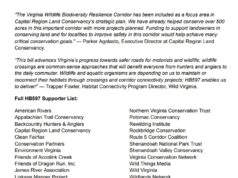See below for some highlights of yesterday’s press conference with the Southern Environmental Law Center (SELC). The full press conference is available here.
First, here’s Will Cleveland of the SELC on Dominion’s Atlantic Coast Pipeline boondoggle. SELC has been doing a lot of work to show that “the light shining on questions about market demand, the cost to utility customers and Dominion’s unfounded arguments for job creation – that light is getting brighter….” Cleveland notes (bolding added by me for emphasis): “…the way that Dominion and Duke have structured their deal to shift all risk of the pipeline development project from their shareholders onto their utility customers.”
Now here’s the sleazy, slimy self-dealing Dominion is involved in (again, this is Will Cleveland of SELC speaking).
“Dominion and Duke are both holding companies and in Virginia the Dominion energy holding company wholly owns the regulated utility Virginia Electric Power. It also is a co-venture in Atlantic Coast Pipeline LLC. When Atlantic Coast Pipeline wanted to get permission from FERC to exercise eminent domain take people’s property and build the pipeline, they had to demonstrate to FERC that there was a market need for that pipeline, what they did instead of actually going out and doing a market survey and figure out what people who needed gas would do is they actually just signed contracts with their affiliated entities specifically their affiliated regulated utilities who have captive customers. They then took those, contracts basically with themselves, to FERC and said here is our evidence that there’s an actual market for the pipeline — and FERC has so far accepted the contracts among these utilities as evidence of need. And that is the basis for which they issued the certificate. But the State Corporation Commission in Virginia plays a critical role here because that is the mechanism by which the regulated utility shifts all of its costs on to its customers through an annual proceeding called a fuel factor. And we have done a lot of litigation to the State Corporation Commission and have had opportunity to engage in some discovery, and through that discovery process we’ve learned some very compelling facts. First is that Dominion the regulated utility has signed a multi-year multi-billion dollar contract with its affiliated Atlantic Coast Pipeline entity, even though Dominion admits it has never actually done a study of whether it needs the Atlantic Coast pipeline to operate its power plants. We have further gotten concessions and admissions from the regulated utility here in Virginia that they pass on the cost of those pipeline contracts to their customers regardless of how much they actually use those pipeline contracts. And moreover, through discovery, we have determined and we’ve submitted expert testimony on this that the pipeline contract that Dominion has signed on the Atlantic Coast Pipeline will actually increase customer costs by about two billion dollars. And that two billion dollars is relevant because all along Dominion has claimed that the Atlantic Coast Pipeline would save their customers money and that those customers would then reinvest the money that they’ve saved, which would produce new jobs and economic growth throughout the Commonwealth of Virginia. If there are no savings, there is no job growth and there is no economic growth. Well our analysis shows that there are no savings, it’s actually a net cost to customers. So what you’re left with, in Virginia at least, is a regulated utility using its captive customers to bear all the risk of a multi-billion dollar boondoggle that the utility has never studied whether it needs it and the utility is going to make customers pay for it regardless of whether they ever use it.
Now, here’s Patrick Hunter from SELC on the ACP’s status. According to Hunter, “as of the middle of March in Virginia…there is no tree felling going on…due to concerns about killing migratory birds...There is currently no right-of-way construction going on in Virginia…[The permits] all require this permit from the Fish and Wildlife Service be in place in order for any construction activities to commence…[approvals] all assume that the project is going to be built along the construction right-of-way that has been analyzed in the environmental analysis documents that have been completed as part of this project. As of Tuesday, [ACP] no longer has authority to continue with the project as it was initially designed, because that project is going to kill endangered species and also impact their habitat…and as of now they cannot do those activities. So they currently do not have permission to move forward with their proposed pipeline route…and it’s unclear what the court is going to require and how Fish and Wildlife will respond to that…construction of the pipeline certainly shouldn’t be continuing not knowing if they’re going to be able to move forward with this current pipeline right-of-way route…As of now…this pipeline route currently is in question…construction cannot continue without permission from the Fish and Wildlife Service.”
Finally, here’s some commentary about how Dominion’s public statements on the Atlantic Coast Pipeline, that it will “continue to push forward with the project,” are aimed at reassuring investors “that everything’s ok with the Atlantic Coast Pipeline, but that’s a rose-colored view”; how FERC has not accepted Dominion’s proposal; and how there’s a “compelling legal argument that all construction for this project needs to stop.”


![Video: Ivy Main Says “the hostility to offshore wind is really just [Trump]; nobody else feels this way…he will be gone and then we will get back on track”](https://bluevirginia.us/wp-content/uploads/2026/02/axiosivymain-238x178.jpg)









![Saturday News: “Ukraine is the biggest and most consequential of all the American betrayals”; “Get Ready for Zombie Tariffs”; Murdoch’s WSJ – “Trump Demeans Himself as He Attacks the Supreme Court”; “Virginia House Delays Action on Bill Banning [Lethal Pesticide] Paraquat”](https://bluevirginia.us/wp-content/uploads/2026/02/montage0221-100x75.jpg)